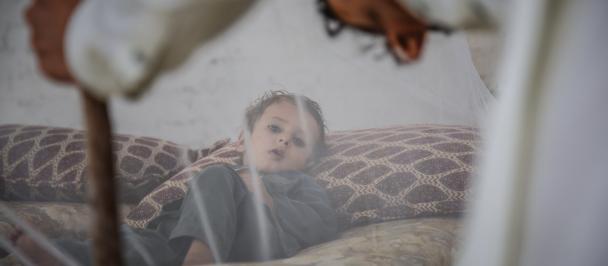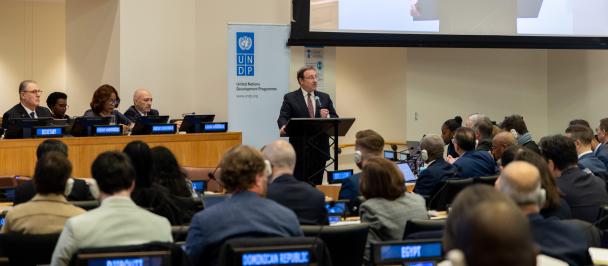Opening Remarks at the High-Level Conference on the Lake Chad Region
As prepared for delivery.
Excellencies, Colleagues, Ladies and Gentlemen,
I would like to thank the Governments of Germany, Nigeria and Norway for co-hosting, together with the United Nations, this important and timely conference on the Lake Chad Region. Our appreciation goes to the Governments of Cameroon, Chad and Niger for their close partnership and to our German hosts, under the leadership of H.E. Heiko Maas, Minister of Foreign Affairs, for making this conference a reality in a short timeframe.
The fact that we have come together here in Berlin - following the 2017 Oslo humanitarian conference - to focus on humanitarian, development and stabilization efforts presents a great opportunity and demonstrates once more our commitment to a New Way of Working. It will allow us to discuss and emphasize the nexus between interventions addressing immediate humanitarian needs and those addressing root causes of the crisis in the longer term. We will also examine the linkages to prevention and building peace.
In this spirit of collaboration, UNDP organized a joint visit with OCHA to the region ahead of this conference to discuss the need for strengthening resilience. The visit highlighted that the humanitarian crisis in the Lake Chad Basin is among the most severe in the world, with more than 10 million people in urgent need of life-saving assistance and protection. The underlying causes for the crisis are rooted in high inequality; perceived social injustice; lack of social service provision; historic marginalization; inadequate economic opportunities; high levels of poverty and the impact of climate change and land degradation. The Boko Haram insurgency and conflict dynamics have further increased people’s vulnerability. Farming, fisheries and pastoralist livelihoods, freedom of movement, commerce and local governance are being disrupted. Children, especially girls, are at risk, as they are disproportionally chosen for suicide attacks. Lured by religious narratives, financial incentives, a glimmer of hope or through violence, many young people lacking opportunity and feeling marginalized are attracted by Boko Haram.
Millions of people have been affected by the Boko Haram violence, with villages destroyed and many people killed. Often women are left as the only caretaker for their families. Where security can be ensured, there is a need to rebuild and put mechanisms in place to help people create new homes and access income opportunities. There is a need to re-establish social services and rebuild relations and trust. To sum it up, there is an urgent need for a scaled-up development response to help people to retake control of their lives.
Needs identified by governments to strengthen resilience in the region amount to USD 2.3 billion for a medium timeframe of three years. While the number might seem high at first, recall that we are addressing root causes of a large-scale crisis with a need to tackle multiple issues simultaneously.
To reduce the dependence on humanitarian assistance and to put the region on the path of sustainable development, humanitarian, stabilization and development agents must work in sync. Scaling-up development interventions in the Lake Chad Basin Region while humanitarian assistance continues will be key to reduce vulnerabilities and strengthen resilience with a long-term perspective. We are convinced that despite operational challenges, it is possible to invest now to strengthen the resilience of individuals, communities and institutions and make the 2030 Agenda for Sustainable Development a reality for them.
Relevant frameworks for action do exist, nationally and regionally. We are working under the umbrella of the African Union’s Agenda 2063; the recently approved Regional Strategy for the Stabilization, Recovery and Resilience of the Lake Chad Basin by the African Union and the Lake Chad Basin Commission; the respective National Recovery and Development Plans; as well as the United Nations Integrated Strategy for the Sahel. The call now is for implementation of these frameworks. The recently established Governor’s Forum of the Lake Chad Basin should play a critical role in this. Thanks to our German hosts who supported governments through UNDP, the Forum will serve as a transnational platform for coordination and exchange and provide a framework for implementation at local level while simultaneously promoting cross-border issues.
Excellencies, Colleagues, Ladies and Gentlemen,
We are working towards the objective of leaving no one behind. The challenges of the Lake Chad Basin transcend borders and go beyond unilateral responses. Under government leadership we need to join forces and scale up our collective engagement. I will be traveling with Mark Lowcock to the region next month to take stock of the progress achieved and send a strong signal for a New Way of Working to tackle the challenges.
Again, I sincerely thank the co-hosts and all partners for encouraging this forward-looking exchange, and I am honored to be a part of the discussions.

 Locations
Locations























